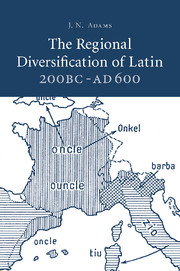Book contents
- Frontmatter
- Contents
- List of maps
- Preface
- List of abbreviations
- Chapter I Introduction
- Chapter II The Republic: inscriptions
- Chapter III Explicit evidence for regional variation: the Republic
- Chapter IV Explicit evidence: the Empire
- Chapter V Regionalisms in provincial texts: Gaul
- Chapter VI Spain
- Chapter VII Italy
- Chapter VIII Africa
- Chapter IX Britain
- Chapter X Inscriptions
- Chapter XI Conclusion
- Maps
- Bibliography
- Index verborum
- Subject index
- Index locorum
Chapter III - Explicit evidence for regional variation: the Republic
Published online by Cambridge University Press: 22 September 2009
- Frontmatter
- Contents
- List of maps
- Preface
- List of abbreviations
- Chapter I Introduction
- Chapter II The Republic: inscriptions
- Chapter III Explicit evidence for regional variation: the Republic
- Chapter IV Explicit evidence: the Empire
- Chapter V Regionalisms in provincial texts: Gaul
- Chapter VI Spain
- Chapter VII Italy
- Chapter VIII Africa
- Chapter IX Britain
- Chapter X Inscriptions
- Chapter XI Conclusion
- Maps
- Bibliography
- Index verborum
- Subject index
- Index locorum
Summary
INTRODUCTION
This chapter and the next five will be mainly about literary texts. Literary evidence for the regional diversification of Latin is either explicit or implicit. By ‘explicit’ I refer to comments by Latin writers about features of the speech of an area or people. Evidence of this type is sometimes referred to as ‘metalinguistic’. Latin speakers from the earliest period were interested in the diversity of the language, and they often noted details or expressed an attitude to the variations that they observed. There were also those who did not describe regionalisms as a linguistic exercise in its own right, but commented on practices particular to a region and made passing remarks about the terminology related to those practices. The corpus of metalinguistic comments is considerable, stretching from Plautus through to late antiquity, and has never, as far as I am aware, been comprehensively assembled. In this chapter I collect and discuss the republican and Augustan testimonia, and in the next the later testimonia.
By ‘implicit’ evidence I mean the use without comment in a text of a word or usage that there may be reason to think was confined to the area from which the writer came. Regionalisms of this second type are hard to detect, and problems of methodology must be addressed.
- Type
- Chapter
- Information
- The Regional Diversification of Latin 200 BC - AD 600 , pp. 114 - 187Publisher: Cambridge University PressPrint publication year: 2007



